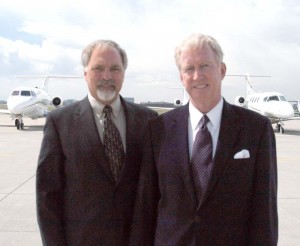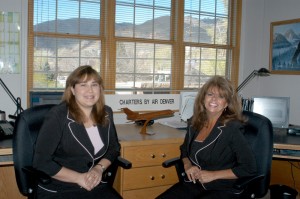
Dave Kempa, founder of Air Denver, Inc., is a commercial pilot with more than 7,500 flight hours. He’s also an amateur race car driver and sponsors a Corvette racing team.
By S. Clayton Moore
A reliable and competitively-priced charter service has become an essential asset to many businesses in this modern age. From massive freight operations to pinpoint travel for critical executives, moving people and cargo from point to point in the untidy post-9/11 aviation world can be a tricky business. For one well-established Colorado enterprise, the secret to success is providing access to literally thousands of charter flights.
Founded in 1981, Air Denver, Inc. is a charter referral company that has become a key provider for businesses and agencies with critical transportation needs. Clients range from the Federal Emergency Management Agency to airlines to small businesses.
The firm boasts impressive access to more than 3,900 charter and airline companies in North America. A fast and efficient proprietary Aircraft Locating System tracks each operator’s flights, giving Air Denver instantaneous access to more than 18,000 aircraft.
“We’re a one-stop shop for all your charter needs,” said Dave Kempa, president of Air Denver. “We find which aircraft will best suit your needs and put you in direct contact with the charter operator.”
Kempa brings a wealth of aviation experience to the company and shares his knowledge with employees and customers alike. He studied aeronautical engineering at Penn State University and aviation science at Oklahoma State University before founding his 135 charter operation, which gave him a strong background in this particular aspect of the aviation market.
“I’m a commercial pilot and an airline transport pilot,” said Kempa, who has more than 7,500 flight hours under his belt. “I’ve flown many of the aircraft out there, so I have a very keen insight into the planes and their performance. From that experience, I can give my employees resources and knowledge about which airports will work for which aircraft, where the baggage will fit and other logistical insights.”
He notes that a referral service is different than a broker. Brokers often deal primarily with a few specific operations and negotiate prices with their own profit margins in mind. As a referral service, Air Denver puts passengers and charter operators in direct contact, taking a commission from the operator, not the passenger.
In fact, because of Air Denver’s wide contacts, Kempa can often negotiate better prices for customers, finding exactly the right flights for their needs.
“The only way that we’re not going to beat someone else’s charter price is if the client finds the same flight that we do,” Kempa said. “With more than 18,000 aircraft at our fingertips, chances are, we’re going to do it better.”

Dave Kempa (left) and Jim Huffman, Air Denver board member, predict that air charter will soon become a more common mode of transportation.
Also at issue is the ever-present ticking of the clock. With a 24/7 operation, Air Denver’s small team of employees can respond to charter requests with startling speed.
“We’ve developed a system where we can find an aircraft anywhere in North America, even for a last-minute flight, in about 20 minutes or less,” Kempa said. “Naturally, it depends on the airplane and the mission, but once you say ‘Go,’ we can have you airborne usually within the hour.”
Charters by Air Denver also offer other advantages, in terms of proximity and flexibility.
“Let’s say you’re going from Chicago to Des Moines,” Kempa said. “With the airlines, you have to go through Omaha. With a charter flight, we can get you there non-stop, and you can probably get your business done in one day. If you’ve concluded your deal and want to take time for a celebratory business lunch, you can. If you’re flying commercial, you may not have the time. With us, you have the option to extend your stay.”
Air Denver recently increased the availability of one-way flights, giving customers even more choices.
“About 200 aircraft are available for one-way flights at any time,” Kempa said. “These are charters that have already been paid for, so we can offer those flights at a significantly discounted price.”
James Huffman, a member of Air Denver’s board of directors, predicts that charter flights will become much more common in the future.
“Chartering an aircraft is becoming much more accessible for the average person,” Huffman said. “A great deal of competition is coming into the marketplace, and it’s driving down prices. The whole situation is going to change dramatically as the very light jets come to market, making this whole concept even more affordable. In days to come, you’ll call United if you want to go to Hong Kong. If you want to go to Omaha, Wichita or Fort Worth, you’ll call a referral service like Air Denver.”
That’s not to say the logistics are always a cakewalk. As the aviation industry tightens its belt in today’s competitive economy, finding suitable flights can be a trying experience. But Air Denver confidently rises to the challenge.

Melissa Berg (left) and Gina DeCarlo, Air Denver charter coordinators, help match customers to more than 3,900 airline and charter companies throughout North America.
“It’s especially hard to find aircraft for passenger flights late at night or on weekends,” Kempa admitted. “Sometimes we’ll go through 20 or 30 companies to find something for a customer. But we’ve been doing these flights for more than 25 years, and it’s a very efficient system.”
Once a client confirms a flight, Air Denver stays in the middle of the transaction. The company provides each passenger with a comprehensive confirmation letter detailing the itinerary, directions to and from airports and information about the pilots and aircraft. Upon request, and at no additional charge, Air Denver’s team can even arrange transportation, hotel reservations or catering. Should any leg of a flight be disrupted, company professionals respond immediately to find a new flight or otherwise work around the problem.
The company’s business is about 60 percent passenger traffic and 40 percent cargo. Unlike some charter operations, which are solely focused on upscale business travelers, Air Denver’s market traverses a wide breadth of the aviation industry. Air Denver has tackled diverse missions, such as hurricane evacuations from the Caribbean, the transport of crash and rescue personnel for train derailments and the conveyance of heads of state. Other unusual functions include flying ailing animals, providing air ambulance services and transporting patients for transplant operations.
Kempa is proud to say that in 2003, he single-handedly saved “Monday Night Football.” With wildfires raging near San Diego, Calif., Qualcomm Stadium was being used as a relief station for firefighters. At the last minute, the National Football League moved the Monday night game, between the Chargers and the Miami Dolphins, to Sun Devil Stadium in Tempe, Ariz. At 8:00 p.m. on Sunday, Air Denver got the call from ESPN and ABC, asking to move 120 staff members to the new site.
“To make matters worse, ESPN and ABC contracts state that their personnel cannot be transported the day of the game,” Kempa remembered. “They have to be there the day before. Also, the San Diego airport closes at 10:00 p.m. Just before 10:00, we had a Boeing 737 on the field for them. I had Transportation Safety Administration staff check my people in, and we had a porter to take their luggage, so they could run out to the airplane. We got them moved in time.”
It’s that kind of perseverance that distinguishes Air Denver from its competition.
“Give us a try on your next flight,” Kempa said. “We deal in options. When you bring us the mission, we’ll provide the service you need, but we’ll also offer you alternatives, in terms of cost savings or better time options. If you have a can-do attitude, combined with the right people and the right connections, it’s amazing what you can do.”
To find out more about Air Denver, call 800-333-4057 or visit [http://www.airdenver.com].











